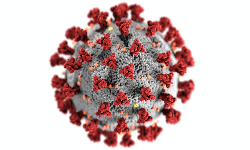UV Radiation and SARS-CoV-2 (Covid-19)
 2020-11-23 (IPMA)
2020-11-23 (IPMA)
It was recently published in the international journal Photochemistry and Photobiology, a scientific paper showing the potential of UV radiation in the inactivation of SARS-CoV-2 (Covid-19): Potential of Solar UV Radiation for Inactivation of Coronaviridae Family Estimated from Satellite.
This is the first paper published in an international scientific journal on the relationship of SARS-CoV-2 (Covid-19) and a meteorological element, in this case solar radiation.
The research that started during the lockdown of March and April, resulted from cooperation between the Portuguese Institute of the Sea and atmosphere, the Centre for Research in Technologies and Health Services of the University of Porto (CINTESIS), the Portuguese Association of Skin Cancer (APCC) and the University of Veterinary Medicine of Vienna (Austria). It aims to contribute to the guidance of public policies in the fight against the spread of the virus.
These results show that UV solar radiation has a high potential to inactivate these viruses, depending strongly on geographic location and season. In tropical and subtropical regions (e.g., São Paulo, 23.5°S), the daily survival fraction of the virus is less than 0.01 % throughout the year, while at higher latitudes (e.g., Reiquiavique 64°N) this fraction can only be found in June and July.
For example, in Lisbon and in the period of March, it would take between 3 to 10 hours for the virus to be eliminated by solar UV radiation; on the other hand, in winter we have times for sterilization of more than 20 hours, that is, one whole day is not enough to sterilize surfaces outside.
This study - and all the work done on the influence of meteorological factors on the new coronavirus - shows that solar UV radiation is effective in inactivation of the virus.
These data have important practical potential implications, in terms of Public Health recommendations, to minimize the potential for contagion across different surfaces and even in the contagious potential of SARS-CoV-2.
It is also an argument for a potential recommendation to the population to be able to enjoy sun exposure this autumn, winter and even early spring, when UV index levels are rarely higher than 5, so they are not harmful to the skin or significant risk for increasing numbers of Skin Cancers, particularly for moderate exposures.
Additionally, there could be a recommendation to place the largest number of objects, tools, clothing, among others, to the sun exposure that may occur in these months. The stimulus of outdoor walks, particularly on sunny days, is to be encouraged by the psychological and physical benefits, particularly in this time of COVID-19.
In addition to this article, it should be noted that in this year 2020 the levels of the UV Index were very high throughout the month of May (8 to 10, on a scale of 0 to 11, in most localities of Portugal (Mainland and Islands) when there was a sharp reduction in the number of COVID-19 cases and reduction of lethality at the same time, keeping these levels low until mid-September, when UV levels decreased significantly. From that time to date, UV levels naturally had a significant reduction of about 60%, during which time the number of cases and mortality rate increased. Of course, this incidence has to do with multiple factors, such as the closure or opening of economic activity, the opening of schools, etc.
The authors of the study were: Fernanda Carvalho (IPMA), Diamantino Henriques (IPMA), Osvaldo Correia (Dermatologist, President of the Portuguese Association of Cutaneous Cancer, Associate Professor of the Faculty of Medicine of Porto; Research Centre in Technologies and Health Services of the University of Porto - CINTESIS) and Alois Schmalwieser (University of Veterinary Medicine, Vienna, Austria).

